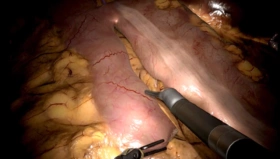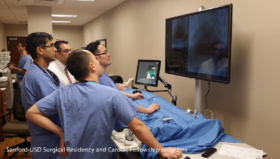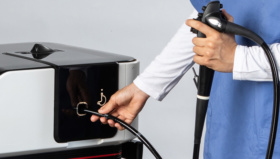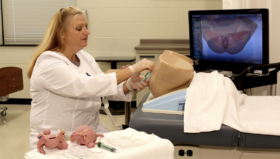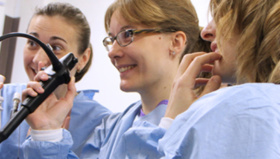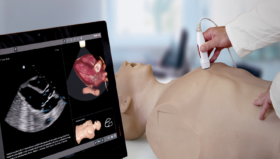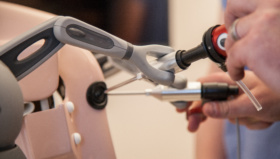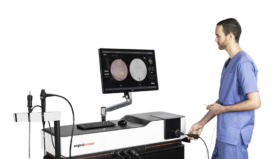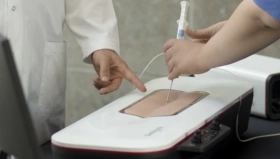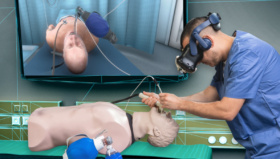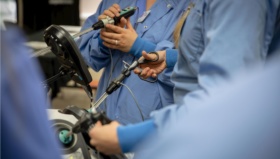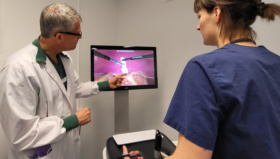The Strasbourg Experience
Two ANGIO Mentor Suite simulators were incorporated in their simulation training using a unique training curriculum that includes training, assessment and debriefing.
GEPROVAS (European research group on prosthesis for vascular surgery), based in Strasbourg University Hospital, France, is a non-profit association founded 25 years ago for the purpose of inventing new devices used in vascular surgery.
Thanks to an innovative and multidisciplinary approach combining research, analysis and education, GEPROVAS aims to become the reference center in Europe in the field of characterization and development of vascular devices but also in the training of vascular surgeon on new minimally invasive surgery techniques.
The Challenge
“Technologies are developing constantly, we have new devices every day and we do not end our career like we started it, as it was in the past. We must train physicians that are currently performing old practices, on new devices and techniques”, says Dr. Nabil Chakfe, vascular surgeon, head of GEPROVAS, and Head of the Department of Vascular Surgery and Renal Transplantation at Strasbourg University Hospital. “In addition, we needed a tool to train our residents and fellows without risking our patients.” However, residents have “less and less time during their training period to practice, their daily time is controlled and they have to rest to comply with working hour restrictions.”
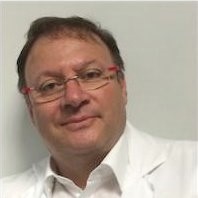
Dr. Nabil Chakfe, vascular surgeon, head of GEPROVAS, and Head of the Department of Vascular Surgery and Renal Transplantation at Strasbourg University Hospital.
It was from this growing need that the idea for the Vascular Surgery Simulation and Training Center in collaboration with GEPROVAS was conceived. “It was obvious that simulation must be a part of the training for new residents and physicians”, said Dr. Chafke.
When designing and developing the curriculum and the requirements for the simulation training, it became obvious to Dr. Chafke and his colleagues that the quality of the training was directly dependent on the type of simulator used for the simulation training. They needed a simulator that would replicate as closely as possible the instruments and procedures of the actual operating room.
The Solution
In 2014, GEPROVAS purchased 2 ANGIO Mentor Suite simulators to be used in their simulation training in their vascular surgery residency and fellowship programs.
“Now practicing on the ANGIO Mentor is really a part of training in our vascular surgery department. All residents and fellows have a specific curriculum and they have to perform 2 hours per week of training and assessment in order to evaluate and improve their skills”, said Dr. Chakfe.
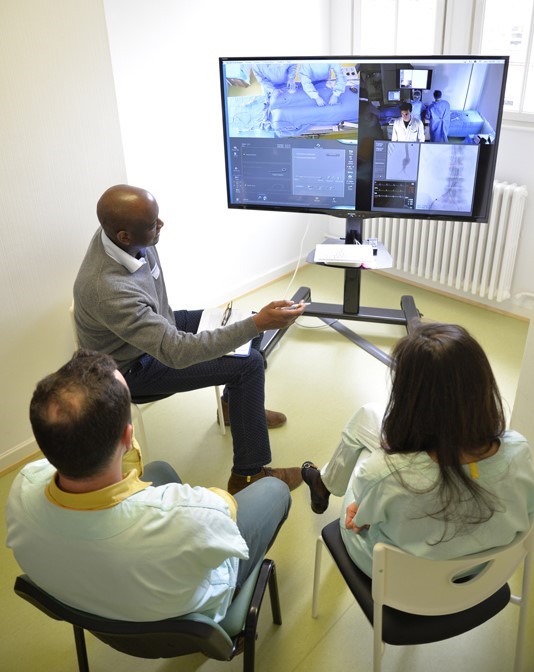
It is very important to take time to discuss all these points in the debriefing session in order to improve their skills.
Dr. Yannick Georg, Vascular Surgeon and Head of Education department of GEPROVAS: “We start using simulation regardless of the student’s level. All students perform simulation. Novice students begin by observing fellows and later help them to perform different procedures in order to become relatively autonomous with the simulator to perform basic tasks, such as intraluminal navigation or diagnostic arteriography.” ANGIO Mentor’s library of modules provides different levels of difficulty from basic skills tasks to complex procedures. A variety of anatomies are available from normal to difficult or rare, allowing the trainees to progress according to their level of proficiency.
“We are assessing the trainees using a grid adapted to the procedure type. We divide the procedure to many steps evaluated as they are carried out, each step gets a score. We assign a final score to the procedure, which is assessed considering the trainee’s postures and gestures.” The ANGIO Mentor’s performance reports can be tailored to record those metrics we think are important.
Prof. Chakfe: “We proposed a pedagogic approach associating video recording, briefing and debriefing sessions that help to improve their skills and also to assess. We equipped one of the ANGIO Mentor simulation rooms with video recording, which helps us to evaluate the students – how they are facing the simulator, how they move their hands, and to make correlation between what we see on the screen and how they actually work. This way, we can take into account the time code when the student is very poor and also when he is very good. It is very important to take time to discuss all these points in the debriefing session in order to improve their skills.” The ANGIO Mentor allows us to show the trainee exactly how he/she performed on the all aspects of the simulator and the correlation between his/her performance and what is seen on the Fluoroscopy screen.
The Outcome
Following the experience of the last 3 years, Prof. Chakfe concludes: “We see that repeating the procedure on the ANGIO Mentor makes trainees better when they are actually doing the procedure in the operating room. They immediately ask for the device, they know that they have to talk to the patient, explaining that he will have some iodine injection, ask him not to move. Now the procedure is extremely fluent and more than in the past.” Simulation training on the ANGIO Mentor has provided a seamless transition between the dry lab and the operating room.
By recording data using the ANGIO Mentor, we can set a proficiency level to determine when trainees are ready to perform surgery in the operating room. “We are recording data when training and assessing our students in order to demonstrate the improvement but also to find what are the most important variables that make them better during training.”
We need to take time to go to the simulation center rather than losing time in the OR doing mistakes on our patients.
“We need to take time to go to the simulation center rather than losing time in the OR doing mistakes on our patients. We strongly believe that simulation will become a necessary part of training in the future”. The ANGIO Mentor is an integral part of the making vascular surgical residents and fellows better surgeons and physicians.
